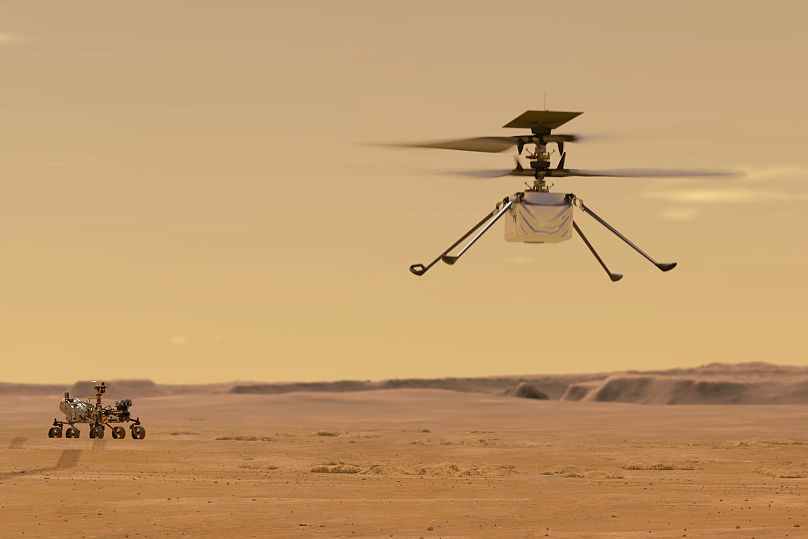The Ingenuity helicopter, which landed on the Red Planet along with the Perseverance Rover on 18 February, is expected to fly for just 40 seconds for this first test flight.
NASA has completed the first ever powered, controlled flight on another planet on Monday, confirming its Ingenuity helicopter had successfully taken flight on Mars.
The helicopter, which landed on the Red Planet along with the Perseverance Rover on 18 February, was expected to make a 40-second first flight.
The Rover is sending back data now, and longer video of the feat should arrive in a matter of hours.
“We can now say that human beings have flown a rotorcraft on another planet," said MiMi Aung, Ingenuity Mars Helicopter Project Manager at NASA's Jet Propulsion Laboratory.
An earlier date was planned for the first flight, but it was delayed due to a technical problem during the testing of its rotors.
The team behind the mission to conduct the first mechanical flight on another planet faced a number of challenges - the biggest of which is how to get the helicopter off the ground in the Martian environment.
Atmospheric pressure there is very low, about one percent of atmospheric pressure on Earth.
"The first and foremost challenge is to make a vehicle that's light enough to be lifted, and then second is to generate lift, the rotors, the rotor system has to spin very fast," said Aung.
The attempt was touted as a "Wright brothers' moment," the first powered, controlled flight on another planet.
"When the Wright brothers flew for the first time, they didn't fly a fully-equipped passenger airplane, they flew an experimental aircraft to show that it's possible to do powered flights," said Ingenuity chief pilot Havard Grip.
The Mars helicopter holds a piece of the Wright brothers' first airplane, a small swatch of fabric from the 1903 Wright Flyer.
The team had to make some adjustments to ready the helicopter, including installing a software update from millions of miles away.
“Our team considers Monday’s attempted first flight like a rocket launch: We’re doing everything we can to make it a success, but we also know that we may have to scrub and try again,” warned Aung.
The 1.8kg helicopter was to attempt to rise 3 metres into the air on its first flight, followed by up to five increasingly higher and longer flights over the course of a month.
"It'll be the first powered flight by an aircraft on another planet, and we've, in fact, met most of our goals for this project just by getting to the point where we are right now," says Grip.
If Ingenuity is successful during its 31-day experimental trip, it will prove that powered flights can be accomplished on Mars.
"Ingenuity will open new possibilities and will spark questions for the future about what we could accomplish with an aerial explorer," says Lori Glaze, director of NASA's Planetary Science Division.
"If this thing works, our capability to explore Mars is going to expand by orders of magnitude, both with purely robotic and combined human robot exploration," says Robert Zubrin, president of advocacy group the Mars Society.
On April 6, NASA's Perseverance Mars rover took a selfie with the Ingenuity helicopter.
Ingenuity's helicopter airfield is right next to the Perseverance rover's landing site in Jezero Crater.
The rover will observe the test flights from a distant perch, before driving away to pursue its own mission: hunting for signs of ancient Martian life.
Rock samples will be set aside for eventual return to Earth.












